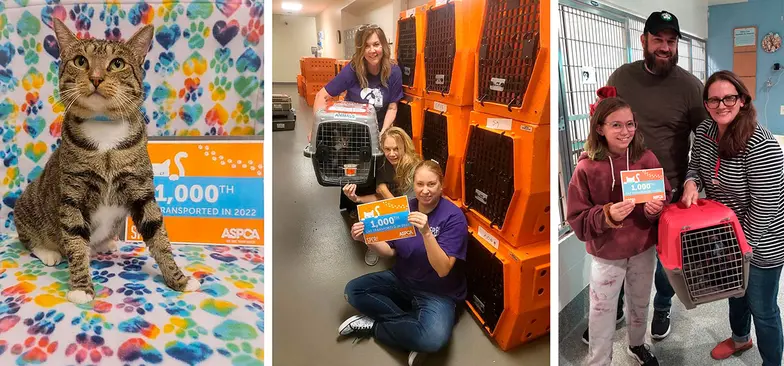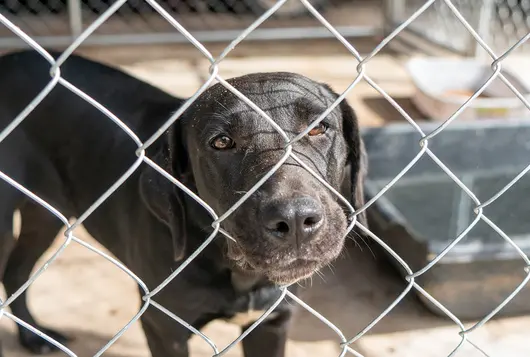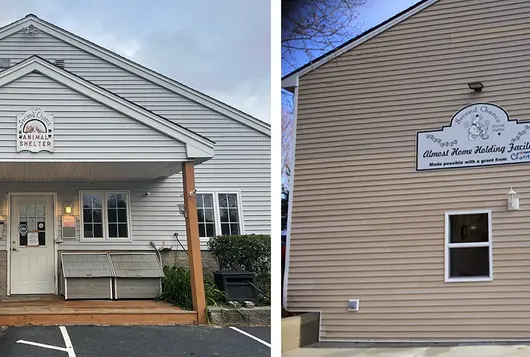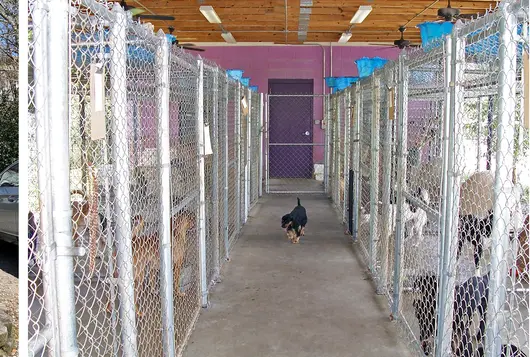They Did It: SPCA of Texas Transports 1,000th Cat

L: Chance; Middle: The SPCA's Sarah Wateska, Robyn Stevens, and Amanda Smith; R: Chance and his family.
WHO: SPCA of Texas, Dallas
DID WHAT: Transported their 1,000th cat from Dallas.
Named Chance, the cat was flown to the Massachusetts SPCA-Angell in Boston on October 4. The SPCA of Texas is the ASPCA’s largest cat transport partner, moving pets to locations throughout the northern U.S. The ASPCA Relocation team regularly helps fly felines from crowded shelters in Texas to shelter partners where they have adopters waiting.
At the SPCA of Texas, Victoria Cowper, Vice President of Operations; Maura Davies, Vice President, Marketing & Communications; and Kelli Eaves, Senior Director of Lifesaving Initiatives, discuss how their organization managed this milestone while juggling hundreds of animals in their facility, a distemper outbreak, and challenges brought on by the pandemic.
ASPCApro: Who was the 1,000th cat?
Maura: The 1,000th cat’s name is Chance, a one-year-old male brown tabby.
ASPCApro: How was Chance selected?
Kelli: One of our community cat caretaker volunteers brought Chance to us. She suspected he was dumped by his previous owner into the feral cat colony she manages, which is in an industrial area. This compassionate caretaker noticed Chance was not thriving and wanted to give him a second chance—hence the name.
ASPCApro: What is Chance’s personality like?
Kelli: Chance is very sweet. Once he was in foster care, he revealed his big, happy personality.
ASPCApro: Do you have other relocation partners besides the ASPCA?
Kelli: Yes, we work with some fantastic partners based in Texas—including Hearts and Bones, Rockwall Pets, and Pets Going Places—that help us transport dogs to Wisconsin, New York, and Minnesota. We also have staff and volunteers who regularly transport to other parts of the country. And we work with breed-specific rescues for dogs we tend to have a lot of, like Great Pyrenees, Huskies, and German Shepherds. Still, we’re always open to establishing relationships with new partners.
ASPCApro: How long have you had a relocation program, and how many animals have you transported as a result?
Kelli: We’ve always worked with local rescue groups to move animals out of our shelter, but in 2020 we began our relationship with the ASPCA Relocation team and established partnerships with rescues and shelters outside of Texas. Since 2020, we’ve transported about 1,700 dogs and almost 1,500 cats all over the country.
ASPCApro: What have you learned about transport?
Kelli: From the ASPCA team, we’ve learned so much about transport logistics, which has enabled us to establish our transports, protocols, and procedures. Many of our intakes come from animal cruelty investigations, so we often get large numbers of one specific breed. For example, in 2021, we seized almost 40 Weimaraners, several of whom were pregnant. We transported them all over the country, and Weimaraner rescue groups worked together to find placement.
"Thanks to an amazing group of volunteers we recruited from local TNR groups, our cat transports are thriving."
ASPCApro: How many of your staff are dedicated to relocation efforts? Do other staff pitch in when it comes time for transport?
Kelli: We used to have up to three staff members dedicated to transport. Short-staffed like everyone else, we collaborate with multiple departments to create these positive outcomes. Thanks to an amazing group of volunteers we recruited from local TNR groups, our cat transports are thriving. Our Feline Lifesaving Initiatives team handles the logistics of twice-a-month flights and manages its own adoption program. For Chance’s transport, Sarah Wateska, our Feline Lifesaving Initiatives Manager, coordinated the logistics and led the volunteers who worked hard to get the cats ready, loaded, and on the flight to Massachusetts. Everyone in the organization pitches in for dog transports since we don’t have a full-time staff person for this position.
ASPCApro: What’s the best thing about relocation, in your opinion?
Kelli: Relocation allows us to create breathing room for some of our harder-to-place populations by freeing up space, which is always at a premium in Texas shelters. We help other municipalities, especially with cats, get on transports. And when it comes to emergencies, the ASPCA Relo program is organized, hardworking, and flexible.
ASPCApro: How did the pandemic and a distemper outbreak this year affect your relocation efforts?
Victoria: The lower spay/neuter surgery rates during the pandemic resulted in one of the largest kitten seasons we’ve seen in years, and relocation made a tremendous impact, resulting in hundreds more live outcomes. When our shelters were closed to the public this year due to a distemper outbreak, we continued to move cats out of our shelter to loving homes by transferring them out with help from the ASPCA.
ASPCApro: What are any other challenges you’ve had to navigate?
Maura: A big focus this past year was keeping cats and dogs in homes. Our Pet Resource Center—which offers food, medical assistance, pet deposits on housing rentals, and low- and no-cost spay/neuter assistance—has helped more than 2,700 pets so far this year.
We also saw an increase in kittens born outdoors during the pandemic, and they have become part of our transport cycle. These kittens would have otherwise led a life on the streets. We work with Good Samaritans who find kittens and keep them quarantined until transport time. They enter our shelters just for vaccines, exams, and spay/neuter surgery before boarding flights to find homes up north. This resource has saved many lives and had a substantial positive impact in Texas.
ASPCApro: What was Chance’s outcome?
Maura: After arriving at Worcester Airport on October 4, he was taken to the MSPCA at Nevins Farm and was adopted by a lucky family just days after becoming available.
We have lots more on this subject:


